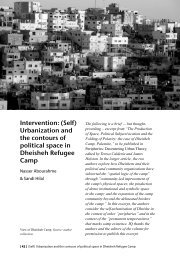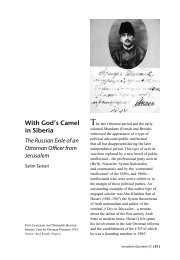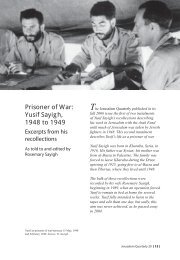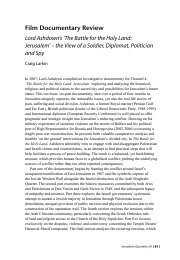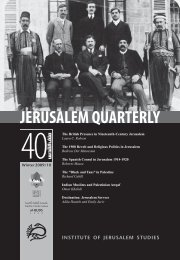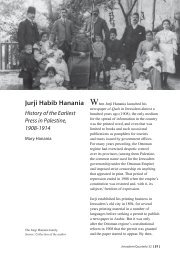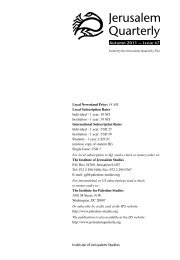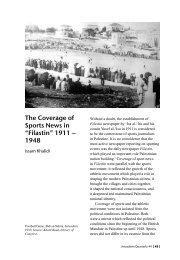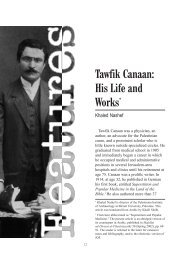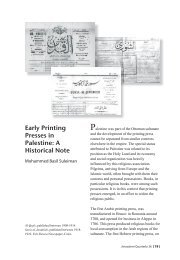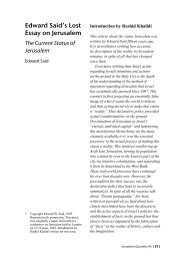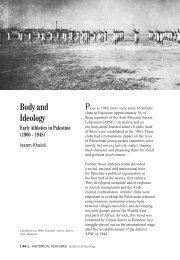PLUNDERING PALESTINE - Jerusalem Quarterly
PLUNDERING PALESTINE - Jerusalem Quarterly
PLUNDERING PALESTINE - Jerusalem Quarterly
Create successful ePaper yourself
Turn your PDF publications into a flip-book with our unique Google optimized e-Paper software.
preserve Palestinian books, the second a brief sentence from the ‘field’ where the<br />
books are being acquired, the formerly Palestinian neighbourhood of Musrara, near the<br />
walls of <strong>Jerusalem</strong>’s Old City.<br />
I find these documents odd and unexpected. 9 What is meant by Warman’s memo,<br />
which throws us immediately into the deep water of the issue of ownership? And<br />
what lies behind Yoel’s ten words mentioning the collection of books so incidentally,<br />
apropos other things? At this moment I think of the limitations of this research,<br />
and perhaps – if I am not overreaching – of the boundaries limiting the work of<br />
the historian: her dependency on documents, and all the documents that she does<br />
not succeed in finding (due to inability or overflowing archives or simply missing<br />
what one is seeking). I once again ponder Yoel’s ten words: I am entranced by their<br />
simplicity and openness, by the straightforward manner in which they lay before us<br />
this historical event, in an almost naïve gesture. At the same time, I cannot but feel<br />
troubled by the events, words and actions that lay behind them. 10 What are the books<br />
in question? Who does the word “our” refer to? Who are the collectors? And where<br />
did they collect books on the previous day?<br />
It is necessary to read many more documents before we can answer these questions,<br />
decipher them, and realize that these words characterize the entire affair of the<br />
‘collection’ of Palestinians’ books: a constant and ongoing movement between<br />
exposure and concealment, between explicit statements and vague, almost alienated<br />
general rhetoric, which naturally plays a political role.<br />
Owners on the Margins: The Question of Return<br />
Warman’s memo explicitly mentions custodianship, not ownership. Between May and<br />
the beginning of August 1948, the official treatment of the books was one of restraint.<br />
In all the letters, reports and memos from this period, the staff of the National Library<br />
reiterates the stance that the Palestinians’ books have been entrusted to the Library for<br />
indefinite guardianship. In all of these documents there appear, if only in the margins,<br />
legal owners who may one day return. I believe it would be wrong to claim that the<br />
books’ owners were the primary concern of the National Library’s employees although<br />
they may have believed that the books would one day be returned. This may explain<br />
why the Library’s eagerness to receive the books has not yet taken on an overtly<br />
possessive shape.<br />
Here is where the work of interpretation is essential, but also where the act of<br />
interpretation becomes so charged. Some would consider Dr. Warman’s appeal to the<br />
Custodian a testimony of his careful treatment of the books and his sincere efforts<br />
to ensure the property’s safety and preservation. I, on the other hand, am inclined<br />
to read these words – with their urgent claim for ownership only two weeks after<br />
<strong>Jerusalem</strong> <strong>Quarterly</strong> 33 [ 11 ]


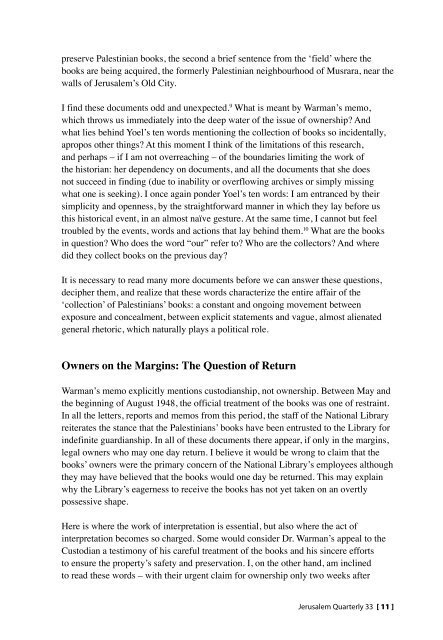
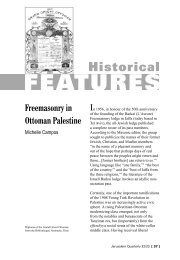
![In Search of Jerusalem Airport [pdf] - Jerusalem Quarterly](https://img.yumpu.com/49007736/1/180x260/in-search-of-jerusalem-airport-pdf-jerusalem-quarterly.jpg?quality=85)
